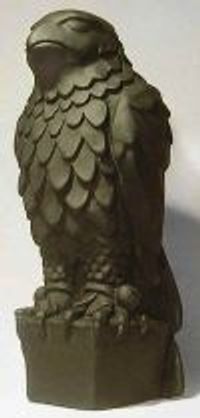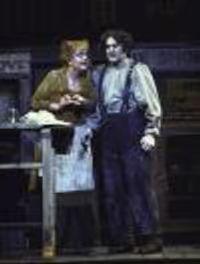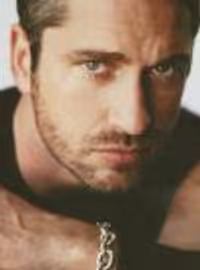Analyzing Sweeney Todd solely based on the original production
#25re: Analyzing Sweeney Todd solely based on the original production
Posted: 10/26/06 at 10:03pm
I'm really enjoying your Sondheim class, WRQ - keep up the good posts!
Anyway, to add something semi-productive to the conversation, I'm also a big fan of Johanna (act 2), but I found the original staging distracting. Yes, by dispatching of most of the customers that come to the barber shop we see how mundane butchering people has become to Sweeney, but there still is emotion there. I think Sweeney does still care about Johanna, but he knows life can't be like it was so he goes about on his new mission. I didn't really catch that until the Doyle production where I focused more on the words (had to with no fancy barber chair to watch).
As much as I love Hearn's "disappointment" in that scene on the DVD when a customer comes in with his child/potential witness and he can't kill him, I think it's misplaced humor.
#26re: Analyzing Sweeney Todd solely based on the original production
Posted: 10/26/06 at 10:18pm
Btw, Sondheim has disputed the idea that the chorus is used in a Brechtian way. He thinks of the chorus as closer to a Greek chorus or the chorus in Allegro.
BSoBW2
Broadway Legend Joined: 12/8/04
#27re: Analyzing Sweeney Todd solely based on the original production
Posted: 10/26/06 at 10:30pm
How does one whip oneself?
Never mind, I don't want to know.
Theatre is at its best when it makes the audience uncomfortable.
#28re: Analyzing Sweeney Todd solely based on the original production
Posted: 10/27/06 at 3:37am
"You've been watching The Making of Sweeney Todd, wickedrentq."
Considering I didn't even know that existed...I'm sorry to say I haven't. I've just been reading some books. Though now I think I really want to see that...
nobodyhome, sorry I'm not sure exactly what you're referring to with that signor stuff...
Hmm, I guess I see your point about the end. I think i meant more...not that everything was exactly the same but like...his life is still hopeless and without meaning.
You're right about the naive though--it always struck me at least in the revival. Now, I'm much more familiar with the image of the revival, so at least based on that, I just assumed he was talking to himself. Recounting to himself how he was naive twice, and did stupid things twice, etc.
It could be really late and i may end up feeling really stupid for not knowing, but what's HGO Caroline?
"I'm really enjoying your Sondheim class, WRQ"
So am I! But this is nothing. Wait till next semester when I get to take the music of Gershwin and BERNSTEIN! I can't wait to bump my Bernstein love thread and just go on and on about his genius in every composition of his. Not to mention the fact that the West Side Story paper will prob be given as a 4-6 page paper and I'll make mine 20 pages...
In terms of act 2 Johanna...I'm not sure how I feel staging-wise. I really missed the bell. I love listening to the OBC and the bell as people enter. Not even because what it means, but...I just love the sound.
I don't think having the customer come in with the child is misplaced. I think it places a real element to it--reminding the audience that he just can't kill everyone, and that he is smart enough to realize he can't when a kid comes in, no matter how compelled the kid is. I guess it might fit better not in the middle of the song, but there's really nowhere else it could go...
I think there's also a difference in the interpretations. I definitely saw more...humanity, sympathy in Cerveris than I did Hearn, which is fine for both. Hearn was just creepy. I think for him, the visuals worked well. I mean, I'm fine with them not being in the revival, and they definitely can be distracting the first time you see it, but I think overall I like having the visualness of him killing them--really visualizing his dehumanization. And even if you are seeing the show for the first time, it still strikes you how he sings about Johanna while cutting these throats and such. (that was my reaction anyway). But, your point is certainly valid. As nobodyshome said, so much o the show can be different with different actors, directors, and perceptions.
Interesting he finds similarity to allegro in Sweeney, since wasn't Company his attempt to make Allegro work?
Hmm, interesting about Company. I realize I'm now confused about something. Was Marry Me A Little originally supposed to conclude the show? Being Alive is mentioned as the third concluding song, Happily Ever After the second. it would be very interesting if they actually wanted the show to end with Marry Me A Little...I see where people are a little...disappointed in Being Alive..lyrically, Happily Ever After seems to have more of that ambiguity that themes the rest of the show. But still, I enjoy Being Alive.
re: the Brechtian chorus...isn't that much more different than a Greek chorus is it? Both comment with the action and take a part in it, but...I really don't know much about this, please forgive my ignorance if I am wrong, but the Brechtian chorus also seems to make sure to speak to the audience, tell them it's a tale, etc. The Greek chorus doesn't do that. So wouldn't the chorus telling the audience to "attend the tale" make it more Brechtian, even if that's now how Sondheim would like to consider it?
Sure you don't wanna know BSo? ![]()
"Theatre is at its best when it makes the audience uncomfortable."
Couldn't agree more ![]()
BTW, I should have a briefer post on ITW tomorrow. Not so much to analyze, but still interesting things I learned...totally on my own since we're not covering it...no homework, figured I'd take advantage.
#29re: Analyzing Sweeney Todd solely based on the original production
Posted: 10/27/06 at 5:01am
I think that perhaps you have been watching it indirectly. IIRC, some of it's in Broadway: The American Musical. Footage of Sondheim at the piano, discussing the score and how he put it together. Not positive if it's in there and don't have it handy to check.
Btw, if you're in New York or Los Angeles and can get to the Museum of Television and Radio, you can see The Making of Sweeney Todd there.
Are you reading Banfield's Sondheim's Broadway Musicals or Swain's The Broadway Musical? Both are worth looking at.
I don't think that Sweeney is without hope in the first scene with Anthony. If anything, he's full of hope and expectation, though fear as well. He's tense and nervous, but also expecting to find Lucy and Johanna. The expectation of being reunited with them is what's kept him going for 15 years. He may have considered the possibility that it wouldn't work out that way, but the hope is what's kept him going.
I don't mean to suggest that there's no connection at all between the first time he sings "The Barber and His Wife" and the reprise, but the circumstances and his feelings are utterly different and his objective is utterly different. The actor might choose to put in a layer of Sweeney recalling his earlier words with some irony. Or not.
Your explanation of what you meant does clarify it for me and I do agree that Sweeney is, at least in part, aware of how his naivete has destroyed him twice. He thought he was no longer naive, could no longer be taken in, could never again be at the mercy of someone who had power over him, who was manipulating him.
By the "Now, signorini," stuff, I'm talking about the passage in the Pirelli sequence that starts:
Now, signorini, signori,
We mix-a da lather
It's heard on the OBCR, with a second verse. It was cut during previews (as indicated in the published script and I believe in the score as well), but the first half was restored in the first London production and the tour, perhaps to slightly compensate for the cutting of the tooth pulling.
Here's what Sondheim said about the chorus:
Q: I'm surprised to hear that you don't like Brecht because I've always thought of Sweeney Todd being Brechtian.
A: Many people say that and I'll tell you why. You get the lower classes walking up and singing at you so you say "Aha." Then there's the line about "man eating man." But you must understand that it is sung by an insane man at the height of his insanity. It's not the author's point of view at all. Brecht constantly alienates you from the story by having characters turn front and make points. Sweeney is entirely a plot piece which has a ballad motif running through as if there were a narrator. Brecht doesn't have a narrator. If anything, Sweeney's closer to Allegro, which also had a chorus. Sweeney is based on Greek principles, with a chorus commenting specifically and directly. They tell the story. Everybody else just acts within the scenes. "Man devouring man" is sung to another character, not us. The show isn't Brechtian; it's a straightforward operetta with narration by the chorus.
[That's from In Their Own Words: Contemporary American Playwrights, edited by David Savran. If you're looking for it, be aware that there's a second volume, and that's not where you'll find the Sondheim interview.]
Regarding the third customer: Cariou was able to play Sweeney's reactions there very effectively and much more subtly than Hearn did.
"Marry Me a Little" was the first of the four songs Sondheim wrote for the final song in Company. In fact, he realized it was wrong even before he finished it, but Judy Prince liked what he had written so much that he finished it as a present for her.
I don't think that Sondheim has said that Company was his attempt to make Allegro work. He has said something to the effect that his whole career has been about trying to make Allegro work. I think he's said that this was something that Cameron Mackintosh had said to him and he realized how true it was.
The Sondheim show that would be closest to Allegro is surely Merrily.
HGO might mean Houston Grand Opera.
Updated On: 10/27/06 at 05:01 AM
#30re: Analyzing Sweeney Todd solely based on the original production
Posted: 10/27/06 at 5:18am
Here's an interview where he discusses that "fixing Allegro" idea:
http://www.sondheimreview.com/v9n2.htm
MichaelBennett, this is also one of the places (along with the Horowitz book) where he discussed how he had wanted to rework the Beadle-Mrs. Lovett-Toby scene.
elmore3003
Leading Actor Joined: 3/31/04
#31re: Analyzing Sweeney Todd solely based on the original production
Posted: 10/27/06 at 7:37amNobodyhome is incorrect; I saw the show two weeks after the Tony Awards, and the tooth pulling was cut. It may have played previews but it was no longer in the show by the end of June 1979.
#32re: Analyzing Sweeney Todd solely based on the original production
Posted: 10/27/06 at 9:45amElmore - unless they played around with cutting the piece in preperation for the tour, the tooth pulling was definitely not cut. As nobodyhome points out, it exists in the Lincoln Center taping (and in numerous "archival" videos, including one of Hearn and Loudon late in the Broadway run). Perhaps you are thinking of the Pirelli lathering part that was already discussed as being cut.
BSoBW2
Broadway Legend Joined: 12/8/04
#33re: Analyzing Sweeney Todd solely based on the original production
Posted: 10/27/06 at 10:39am
Well, Brecht's music usually doesn't further the plot. Actully, I don't think it does at all. Sometimes, the music doesn't have anything to do - in tone - with the show...which alienates the audience. I can use THREEPENNY, since most people know it and it has a physical score, as an example. The Moritat (Mack the Knife) was originally a fun song, totally not in context with the horrific descriptions of the killings.
I think over time it has changed in tone and seems more like something out of SWEENEY, like the Donmar version, or the recent revival.
I can see how people would say ATTEND THE TALE is Brechtian, but it really is more Greek. Actually, it really reminds me of the "author's prologue" that begins commedia dell'arte plays.
Ciaron McCarthy
Broadway Star Joined: 10/15/06
#34re: Analyzing Sweeney Todd solely based on the original production
Posted: 10/27/06 at 10:39amI hate Hearns Sweeney. He plays him waaaaaaaay over the top. He's like a friggin maniac. Len Cariou was the best Sweeney EVER!! Especially with Sweeneys death. Carious death is so friggin realistic and scary. It haunted me for days!
#35re: Analyzing Sweeney Todd solely based on the original production
Posted: 10/27/06 at 3:27pm
Yes, I did see that bit in Broadway: The American Musical. Heh, I'm a member of the Museum! I'll definitely go this weekend to watch it. I actually think I might have seen it pop up when I was trying to find Night Music...but I didn't have time to watch it.
Right, I see what you mean re: hope. I think...I was getting a bit of ahead myself, kind of saying nothing changed since he realized Lucy died, but that's not when he sings this. Sorry.
OMG, you just made me see the power of that naive! For some reason, I always saw it as strictly blaming himself, which of course he is, but I just...never thought of the parellel of Lovett and Judge--how she manipulated him just like he did. Brilliant!
Re: Brechtian chorus, thanks so much for the explanation everyone. You all are obviously much more knowledgable than me about it--I was just reading a short thing about it and the part of them telilng the story popped up. So I guess it can be closer to the Greek chorus, though I still maintain the typical Greek chorus didn't tell a story...still, it doesn't have to be exactly like them...so yeah.
Man, now I want to learn about Brecht...there should be an unlimited amount of time in one's life to research Broadway history. Things would be so much easier...
Wow...astute of Mackintosh.
Wow, so Sondheim's original version for the end of Company was for Amy to marry Robert? or for Amy to reject Robert and that be the end? That's a little...weird. If that's not it, could you elaborate a bit on his intention for the ending? (Seems you're the one to ask).
Thanks for the link! What actually happened in that trio in the Bond version? Lovett poisoned herself accidentally? Tobias?
Well, you guys have answered my question is it worth trying to see the original production even though I have access to the DVD...thanks for that.
Oh, one more small thing I thought about listening to some songs on my way to class today. In Kiss Me, Johanna says she'll swallow poison--as her mother did.
#36re: Analyzing Sweeney Todd solely based on the original production
Posted: 10/27/06 at 5:13pm
To respond to several things:
Yeah, Cariou's death as Sweeney was really awesome and not like anyone else's.
Re the tooth pulling: As already mentioned, there is considerable archival evidence of its presence throughout the run. In addition, the published script and score are clear about what was cut.
Further, here's an excerpt from an interview with Ken Jennings:
http://www.sondheim.com/features/ken_jennings.html
"Do you remember anything about his [Toby's] background that may have helped the interpretation?
"The abuse, of course. I was upset when they cut the tooth pulling for the road tour. I think they just wanted to make the show a little shorter."
Further still, in The Making of Sweeney Todd video, there is the argument between Prince and John Aron, the actor who played Pirelli, about the cutting of the tooth pulling for the London production. This is during a rehearsal, probably in May 1980, when the Broadway production was still running. Aron complains because he's seen the Broadway production, with the tooth-pulling, and he says that he wouldn't have taken the role if it had been so short (that is, without the tooth pulling). It's possible that he saw the show during previews, but unlikely.
In addition, Prince doesn't say, "But we've cut that from the Broadway production and the show is better without it," as he undoubtedly would have if it had been cut at that point.
Finally, in no account of the show and what was cut from it that is from the time the show was running or soon thereafter does anyone say that the tooth pulling was cut.
But the archival evidence is what's really definitive.
Moving on: In early drafts of Company, Amy didn't marry Paul at the end of Act One. Hence, "Marry Me a Little" and "Mulitudes of Amys," the second song written for that spot. The liner notes for the Marry Me a Little cast recording say that "Marry Me a Little" was the second song written for the spot, but in the 92nd Street Y talk, which was in 1971 or 1972, Sondheim says "Marry Me a Little" was the first, so I think that's probably correct.
Sondheim says that "Marry Me a Little" seemed wrong because they were afraid that the audience might not get the lie that Robert is telling himself—that he wants to get married when his image of marriage is of a relationship that involves no deep commitment or sacrifice. In the end, of course, Prince, Furth, and Sondheim decided that Amy should choose to marry Paul at the end of Act One.
The business with the Beadle is that in Bond, Mrs. Lovett tries to kill the Beadle with a glass of ale that has poison in it. Of course, the Beadle then says, "Why don't you have a glass as well?" and then the glasses get switched. Sondheim had wanted to musicalize this, but then changed his mind. Later, he seems to have considered rewriting it to go back to the original idea.
Updated On: 10/27/06 at 05:13 PM
#37re: Analyzing Sweeney Todd solely based on the original production
Posted: 10/27/06 at 7:23pm
Right, I never heard of the other song in Company, but knew about the cutting of Marry Me A Little, and why it was originally cut.
But that's the end of act 1, right? Is it *known* how Sondheim would have preferred to actually end the show other than Being Alive?
So what happens as a result of the glasses being switched? Does Lovett get poisoned? Or does she stall and the poison never get...drank?
Hrmph...the original production at TOFT is being reformatted and won't be available for weeks. Boo! I was really looking forward to watching Cariou.
Ah well. I think at least I'm gonna watch the Making of Sweeney tomorrow.
Ciaron McCarthy
Broadway Star Joined: 10/15/06
#38re: Analyzing Sweeney Todd solely based on the original production
Posted: 10/27/06 at 10:44pmNobodyhome you are a God!
M?hlethaler
Swing Joined: 10/13/06
#39re: Analyzing Sweeney Todd solely based on the original production
Posted: 10/28/06 at 1:19pmDouble post. Updated On: 10/28/06 at 01:19 PM
#40re: Analyzing Sweeney Todd solely based on the original production
Posted: 10/28/06 at 1:21pmBSo- go see The DaVinci Code
Muhlethaler
Featured Actor Joined: 10/13/06
#41re: Analyzing Sweeney Todd solely based on the original production
Posted: 10/28/06 at 1:22pm
"Why would Mrs. Lovett sing a Latin samba in 19th century London?"
You know what's funny about this statement? "Wait" doesn't even resemble a samba. Sure it sounds latin, but very far from a real samba. "By the Sea", on the other hand, sounds exactly like Bossa Nova. But I'm one of those who find both songs examples of perfection - can you blame me?
#42re: Analyzing Sweeney Todd solely based on the original production
Posted: 10/28/06 at 11:54pm
nobodyhome, thank you so much for the recommendation of watching the making of Sweeney Todd! I unfortunately...slept...accidentally...quite late, and actually only made it to the part where they had finished act 1, but I plan to go back soon to finish it.
I certainly now understand why you thought I watched it--aside from the direct clips , many of the things I read about were mentioned here. I actually suspect some of the quotes came from this special.
But it was so fascinating...not only watching the process of Hal directing, but for Stephen to sit at the piano describing the songs and such. So captivating! It gave me a lot of more insight into the songs. Actually, for my paper on Sweeney, I have to analyze 2 songs--early on, I decided to Johanna Act 2(my favorite), and Green Finch (the character of Johanna is a lot of fun to think about/analyze). But after watching this special, I realize there's no way I can't do Epiphany...the most important and pivotal song in the show. And...I pretty much think the most brilliant in the show...which says a lot. The way the music echoes the state, and the integration of all the motifs...gah, brilliant.
And I agree with what you said re: the tooth pulling scene. The way it was discussed indicated this was the first it would be cut. And that was really funny to watch. He's going on..Britishly and Prince just kind of...calmly nodding and taking it in. I don't know. Maybe it's just me, but I thought it was funny.
So yeah, learning more and more with everything I read/see. Sources like Lincoln Center Library and the Museum of TV rock.
#43re: Analyzing Sweeney Todd solely based on the original production
Posted: 10/29/06 at 12:00am
He's going on..Britishly and Prince just kind of...calmly nodding and taking it in.
Wait...HE who?
TheEnchantedHunter
Broadway Legend Joined: 6/27/05
#44re: Analyzing Sweeney Todd solely based on the original production
Posted: 10/29/06 at 12:03am
I'm ashamed of you, wickedrent1--not a word about Bernard Herrmann's influence on SWEENEY's score? You haven't yet begun your work.
Marion Crane
In transit
#45re: Analyzing Sweeney Todd solely based on the original production
Posted: 10/29/06 at 12:03am
"Wait...HE who?"
Sorry. The actor who played Pirelli in the London production. nobodyhome referred to how he got very upset when Prince informed him that the toothpulling scene would be cut.
#46re: Analyzing Sweeney Todd solely based on the original production
Posted: 10/29/06 at 12:55amWow. That was actually really interesting. I just got smarter, lol.
#47re: Analyzing Sweeney Todd solely based on the original production
Posted: 10/29/06 at 4:42pm
To go back to something that wasn't answered earlier, Cariou was never scheduled to do the New York Philharmonic concert, which was what to led to the Chicago and San Francisco concerts. Bryn Terfel was supposed to do it, and Deutsche Grammophon was talking about it recording it. Terfel had to bow it because he was having major back problems. He did later play the role at the Chicago Lyric Opera.
They could have used Cariou for the concerts. In fact, he had just done it in concert in London, the first time he had done the role in 20 years, as opposed to Hearn, who had played the role a couple of times in full productions a lot more recently. Cariou had been quite good in the concert, even if, for various reasons, he didn't quite scale the heights that he had on Broadway.
Why didn't they use Cariou? Several possible reasons. First, there's no question that his voice has not held up as well as Hearn's, perhaps because he never fully recovered from damage to his vocal cords because of the dirt from the grave in Sweeney getting on his cords during previews until it was realized that this was happening and they changed what was in the grave. He refused to miss any performances, despite advice from his doctor to take some performances off to recover. And the truth is that he sounded good through most of the run, even at the end of it. But some damage had been done. If nothing else, he no longer seemed able to summon the kind of volume that he could early in the run.
Second, I have heard that even though Sondheim wrote the role with Cariou in mind, he preferred Hearn's performance. He does seem to feel that the performances should be over the top—he actually uses that phrase in the Horowitz book, on 72—and that may be why he preferred Hearn (if indeed he did). Personally, I think that Cariou gave one of the greatest performances I've ever seen, especially later in the run. I didn't much like Hearn's performance, although as the years have gone by and I've seen more Sweeneys, I've come to like Hearn a bit more just because I've liked most other Sweeneys less still.
Third, if they wanted a recording to come of the concert, it would probably not have contractually possible with Cariou because of the OBCR.
Fourth, it is possible that Cariou just wasn't available or didn't want to. I don't know.
Anyway, wrq, "Marry Me a Little" was written to be the final song in Company. So you can see why it might not have worked too well in that spot. Personally, I don't think it works too well at the end of Act One.
Sondheim did say at the Y that he wrote "Being Alive" "rather against my will." But I don't know that he's ever said that he doesn't think it was ultimately the right decision. I certainly don't think the show would have really worked with "Happily Ever After." It's the kind of show where you really want to feel that the main character has gone on some sort of positive journey. Perhaps if Robert had been written with a bit more depth it would be different. But given the show as a whole, I think a song like "Being Alive" is needed at the end, even if what leads into it doesn't quite work.
You know, even at the end of Follies, at least in the original version, you feel that the four main characters have learned something. What they've learned may not make them happy or hopeful but they've learned something, things have changed. With "Happily Ever After," it's like we've gone through the whole evening so that the main character can end up exactly the same, having learned nothing. It's not dramatically satisfying. (That's not to say that there aren't some great plays of which this can be said.)
Glad that you got to see at least part of the documentary. And I'm glad to hear that TOFT is (I'm guessing) transferring all that VHS stuff to DVD. The official TOFT Sweeney video has some weird problems, but is well worth seeing.
Thanks, Ciaron, but I ain't no god. Wish I were. ![]()
But still it's nice to hear.
Lizzya9
Broadway Star Joined: 10/14/06
#48re: Analyzing Sweeney Todd solely based on the original production
Posted: 10/29/06 at 4:55pmwow wickedrentq, you sure have a lot of time on your hands.
#49re: Analyzing Sweeney Todd solely based on the original production
Posted: 10/29/06 at 6:13pmYou're right Lizzy. God forbid I do my homework...and get really into it and enjoy learning about it. Maybe I should spend the time I'm on BWW at bars, drinking, and getting drunk. Maybe start smoking some weed. That would be considered a more productive use of my time?
Videos







